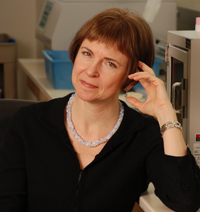 |
Tatiana Bronich, Ph.D. |
NOTE: This profile is part of a series highlighting the 26 researchers who were named UNMC Distinguished Scientists or New Investigators for 2007. Each of these researchers will be profiled in UNMC Today leading up to a March 20 ceremony to recognize their achievements.
- Name: Tatiana Bronich, Ph.D.
- Title: Associate professor
- Joined UNMC: 1995
- Hometown: Moscow
Briefly describe your research in laymen terms, please.
We are interested in understanding how various polymer molecules recognize and interact with each other and form supramolecular structures. We use the supramelecular assembly as a tool to produce polymeric nanostructured materials for application in drug delivery.
What led you to pursue this area of research?
It was always interesting to me how macromolecules form organized structures. After undergraduate training in polymer liquid crystals, Professor Victor Kabanov, my graduate mentor, introduced me to the field of synthetic polyelectrolytes, their complexes and self-assembly properties. Here, at UNMC, it became exciting to include the application of such complexes in drug delivery to treat cancer in the scope of my research interests.
How do you see your research contributing to science?
I would consider myself lucky if the knowledge that was gained in our research could be translated into the future clinical practice and be beneficial in fighting human disease.
Why did you become a scientist?
My mother was a chemistry professor. I remember helping her grade student tests when I was in sixth grade. I always was intrigued by the drawings of structures of coordination complexes. At that time, it became obvious to me that I wanted my future to be in chemistry.
What is your hope for the next generation of scientists?
I believe that the next generation of scientists will turn today’s futuristic ideas and fantasies into scientific reality.
Beyond grant funding, how do you measure success?
You measure success by the amount of joy you derive from what you have done. Besides that, a measure of our success is the success of our colleagues, collaborators and students.
What would you tell a student interested in a research career?
Always maintain your curiosity and do not be discouraged by the negative outcomes. And never let go of your dreams.
Do you have a hero/role model? If so, what do you admire most about them?
I am very fortunate to have had several in my life including my mother and my mentor, Victor Kabanov. I have always admired their dedication to science and their unconditional love for and belief in the people around them.
Tell us about your family and hobbies outside of the lab.
Many in my family have been and still are architects. It was my mother who actually “broke the mold” and became a chemist. My son, Pavel, decided to restore a family tradition — at least in our branch of the tree. He is an architect who lives and works in New York. My husband loves gardening and it is usually the biggest subject of our rare arguments.
List three things few people know about you.
- I used to act with a drama group and perform pantomime.
- I adore my sister, who is an expert in American and English literature. She always was and is my guide in the reading world.
- I love cooking and singing, sometimes simultaneously.